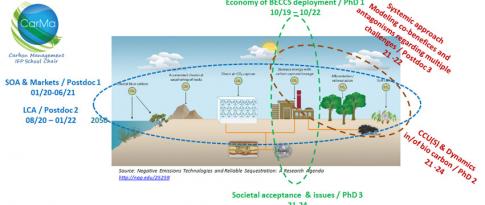06.05.2025
2 minutes of reading
Following her PhD thesis at Imperial College London [1], Dr. Solène Chiquier has been sponsored by the CARMA Chair1, hosted by IFP School, to conduct a postdoctoral research at the Massachusetts Institute of Technology (MIT), specifically working within the MIT Joint Program on the Science and Policy of Global Change. This program focuses on interdisciplinary research combining science and policy to address global environmental changes.

As a result of this research a paper was published [2]: in this study, Solène evaluates various carbon dioxide removal (CDR) strategies under various scenarios to achieve the climate goals of the Paris Agreement. The paper examines five CDR approaches: bioenergy with carbon capture and storage (BECCS), afforestation/reforestation, direct air carbon capture and storage (DACCS), biochar, and enhanced weathering. Using the MIT Economic Projection and Policy Analysis (EPPA) model, Solène and her co-authors assess the global and regional implications of these CDR strategies on land use, energy consumption, and policy costs.
Key findings from the study include:
- Diversified CDR Portfolio : implementing a mix of CDR approaches is the most cost-effective strategy for achieving net-zero emissions. This diversification reduces reliance on any single method, thereby minimizing negative impacts on land and energy resources.
- Regional Customization: the effectiveness of CDR strategies varies by region due to differences in technological, economic, and geophysical conditions. For instance, nature-based solutions like afforestation and reforestation are particularly beneficial in regions such as Brazil, Latin America, and Africa, where they not only sequester carbon but also preserve biodiversity and promote human health.
Timely Deployment: delaying large-scale implementation of CDR strategies could lead to higher carbon prices and increased policy costs. Early and substantial deployment, supported by appropriate policy and financial incentives, is crucial to mitigate climate change effectively.
In summary, the study underscores the importance of a diversified and region-specific approach to CDR deployment, emphasizing that such strategies can achieve climate targets more sustainably and cost-effectively. It also highlights the need for prompt action to implement these measures to avoid escalating costs and climate risks.
1 The aim of the CarMa chair is to advance knowledge and provide insights collaborating with a diverse group of partners from academia and industry. For more information, please visit the chair website.
This study is framed under the IFP School’s Chair entitled “Carbon Management and CO2 negative emissions technologies towards a low carbon future” (CARMA) supported by TotalEnergies OneTech in association with foundation Tuck.
References:
[1] Solène Chiquier, PhD Thesis, The Implications of the Paris Agreement on Carbon Dioxide Removal (CDR) - Techno-Economics, Potential, Efficiency and Permanence of CDR pathways, Centre for Environmental Policy, Imperial College London, 2022.
[2] Solene Chiquier, Angelo Gurgel, Jennifer Morris, Yen-Heng Henry Chen and Sergey Paltsev, Integrated assessment of carbon dioxide removal portfolios: land, energy, and economic trade-offs for climate policy, Environmental Research Letters, Volume 20, Number 2,
>> DOI: 10.1088/1748-9326/ada4c0
Scientific contacts: Maxime Schenckery, Carlos Eduardo Andrade Sandoval
You may also be interested in
IFPEN and the SPLEEN PEPR
IFPEN is co-pilot with the CNRS of PEPR SPLEEN, an upstream research component serving the national acceleration strategy for the decarbonization of Industry.
CarMa Chair: negative CO2 emissions by 2050
Tackling climate change necessarily involves reducing greenhouse gas emissions resulting from human activities, primarily carbon dioxide and methane. The problem is global and the actions required must be implemented within the framework of a systemic approach, with scale effects that are difficult to fully understand. Nevertheless, the Paris Agreement reflects the determination of nations to correct the current trajectory while respecting the legitimate aspirations of emerging countries to raise their living standards.







